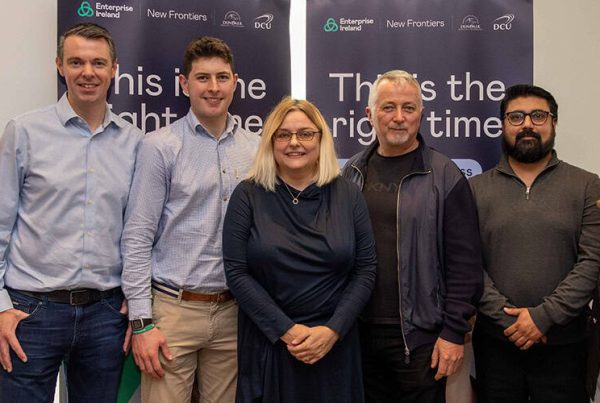
What is the secret to success? Orlaith Carmody, Irish businesswoman and author of Perform as a Leader, says it stems directly from authenticity. Entrepreneurs don’t succeed just because their idea is perfect, but rather it is down to their own unique blend of background, interests and passions.

Orlaith Carmody
Orlaith’s own background as a news reporter and working on the board of RTÉ before diving into the world of serial entrepreneurship, lends well to the leadership and communication skills necessary for building start-ups from scratch.
But Orlaith recognises that the transition isn’t easy. In her book, she highlights how being an entrepreneur can be a lonely journey, especially if you were previously employed. The camaraderie, support and teamwork are suddenly gone and it’s just you and your idea.
This is why she is adamant that a true passion for your product or service is necessary to drive you on. Networking is key to this, and you should take full advantages of everything that’s out there. But the bottom line is you have to believe in it yourself!
As for all the other skills that the entrepreneur needs in their toolkit, can you simply learn them? I decided to ask Orlaith herself when I sat down with her for a quick chat…
Clear, engaging written and verbal communication… are these skills anyone can learn?
Yes, all types of communications can be learnt. At an early stage, it’s easy to get caught up with the job in hand – designing, packaging, bringing to market. It’s easy to think that communication is not important at this point. But then you have to pitch for investment and, suddenly, it becomes critical and you have to catch up!
Courses such as those offered by the LEOs or Enterprise Ireland get people in a room to learn the skills and practice in front of peers. Wherever the bar is, it can always be moved higher. If you’re already a natural communicator, you can learn to be an outstanding communicator. It’s like a muscle, the more you flex it the better you can get.
Even when you think you’re too early-stage to worry about communication, the fact is you need these skills for everything you do: speaking to banks, to providers, negotiating with a component manufacturer, when you’re writing to people… You have this one chance to engage with them – or not. When you pitch at a local networking event, you have the opportunity to connect with people who could be instrumental to your success.
So, everything ultimately comes down to communication. It’s the heart of what you do as a business owner. But if you feel it’s not something you’re good at, go out and get support, because there is plenty of it out there. Grab opportunities to talk about your business and polish your pitch.
People on the New Frontiers programme learn to pitch from day one and will have many different opportunities to pitch along the way. What advice would you give them?
The key is to put the audience first. Don’t assume that people want you to just talk about your product or service, even if that’s what the invitation says. It’s actually an opportunity for you to connect with an audience by letting them know how your offering will benefit them. Put yourself in their shoes and talk about their needs.
Tailor your pitch every time you give it. Don’t just learn one single pitch and deliver that every time – it won’t work if it isn’t about the audience. In the end, your pitch will get stale and you’ll lose passion, which will be picked up by the people listening.
So, keep it lively, relevant and engaging by tailoring it to the audience every time – whether that’s with investors, fellow promoters, potential clients, etc. If you bring new energy to your pitch, that’s infectious and will keep people listening. Obviously you need to know your core script, but adapt every time.
Yes, the security of learning off a template is appealing. Relying on a slide-deck feels safe. But imagine being an investor who has listened to over a dozen such pitches, one after the other. Use your template as a failsafe, not as a blueprint. On a demo day, your goal is to stand out.
Leadership – every entrepreneur is meant to embody it. But how do you become a leader before you have people to lead?
If you came out of a corporate role and had a team in your organisation, you may already have effectively led people to achieve and hit goals. But once it’s you on your own, building your startup, is leadership still relevant? Absolutely, you have to start with leading yourself. You have to be positive and motivated, get into a good routine, be organised and get out networking with people.
By leading yourself and staying on top of your game, every time you go for a meeting with a bank or an investor, you’ll communicate that focus and energy, and, in return, they are more inclined to believe in you and open doors for you.
Then when taking on those first interns or staff members, they will immediately see that passion and drive. This is how you attract the right kind of people; because you need the people who will take a leap of faith in coming to work with your young startup instead of the perk-laden job down the road.
In your book, you discuss your concept of ‘commander to coach’. Can you tell us a little about that?
Being ‘the boss’ is a role that has changed in recent times. The old-fashioned notion that the boss is he (usually) who rules absolutely and must be followed unconditionally used to be universal. I like to describe it as the “I’ve the map written on the back of my eyeballs, trust me, I know where I’m going’’ attitude.
But with millennials and Generation Z, things are different. No one stays in a job for life, people move jobs regularly and they are looking for something more than blind faith and a wage package. They are looking for a sense of purpose. They want to be part of a team that is going to make a difference, they want to believe in what is happening and feel valued, that their voice will be heard, that their contribution is important.
Feeling in line with the direction the ship is going in, feeling motivated and energised – if you as a promoter can offer this, you’ll make a connection with great employees. It’s all about motivating people and being a mentor and coach to your employees, not their commander.
Fewer women than men target leadership opportunities – whether in corporate settings or in building a startup. Why do you think that is still the case?
It is changing, but it is changing slowly. Security is still an issue for women. However we cut it, the reality is that women are still taking the larger burden in care – whether that’s because of children or other carer roles.
Women who have arrangements at work where they can leave earlier to collect children from the creche and other commitments are careful to hold onto such roles because of the security it offers. It stops them, perhaps, in making the leap to entrepreneurship.
Also, women self-select. The phenomenal response to women-only calls for initiatives such as Competitive Start Fund is a clear illustration of this. When I was president of the Irish chapter of the Entrepreneurs’ Organisation, in 2014-2015, I made an increase in female membership a goal. But it was a real struggle and after six years the current president has the same challenge.
Access to finance, to supports, and to childcare are crucial and need to be in place before we’ll see gender parity in leadership roles. The Silicon Valley culture, which I saw when I started working with start-ups 10 years or so ago, was built on this notion that the start-up was your entire life. You lived in the office, practically sleeping under the desk, and you didn’t surface until your product was built.
When I was a consultant to the first Propeller Programme for women at the DCU Ryan Academy, we knew that this approach would never appeal to women. So the programme was carefully designed to fit with the lifestyle patterns of those who would be taking the course, and a direct rejection of that startup ‘mythology’ which no one needs – male or female – to succeed.
That programme has been very successful, and there are a good number of programmes out there now that are more user friendly. They give participants the space to fit something else in – whether that’s childcare, or a part-time job that funds your start-up, or learning opportunities. We’re much more sensible now and the focus on work-life balance is a healthy one.
When flexible working hours are right across the board – at whatever time of life and for whatever reason – we’ll really see change.
Why not just legislate for gender parity? Wouldn’t that be the quicker solution?
It’s possible to legislate, but I don’t know if we’ll see it here. In the UK, public boards have a quota of 30% female participation, here in Ireland state boards are now gender balanced, and part filled by a public appointment process. I was one of the first cohorts onto a state board (RTÉ, 2010-15) where some of the appointments were by competition rather than by Ministerial selection.
Eight years on, private boards are still not as balanced as they could be because there is no compulsion to appoint women, and no one wants to see a situation where a woman is only appointed because of her sex, not her skillset. We probably could do more.
However, in the corporate world, people are selected for boards from the executive pool. If women aren’t in that pool to start with, we can’t then complain that they aren’t chosen to be on boards. Women who have had to step back to have children, or haven’t pushed for promotions aren’t there and available for selection.
Recent research from DCU on the impact of maternity leave gave a fascinating insight into the role of the company in a successful maternity leave. The company, and the line manager in particular, have a huge responsibility in how the woman re-engages. When a woman feels that her employer sees maternity leave as a problem, then it becomes a problem for her too.
Welcoming an employee back, making sure she feels facilitated to get back into work and pick up where she left off, is crucial. As we hit full employment and retention becomes an issue for businesses, the onus is on the employer not to make maternity leave a stumbling block. That way, women will continue to climb the ladder and will be in that executive pool where they will get picked for boards. They will be loyal, because they were supported. That’s good leadership.
Orlaith Carmody’s book, Perform As A Leader – The Skills And Strategies To Take You Where You Want To Go, is published by Ballpoint Press. Find out more at gavinduffyandassociates.com.
About the author

Scarlet Bierman
Scarlet Bierman is a content consultant, commissioned by Enterprise Ireland to fulfil the role of Editor of the New Frontiers website. She is an expert in designing and executing ethical marketing strategies and passionate about helping businesses to develop a quality online presence.
Recent articles

The New Frontiers Programme Connects 158 Founders With Success Stories

Raise Your Startup’s Visibility & Credibility By Entering These Competitions

Founder Perspectives: Lessons From Building Businesses In Sustainability

Tech Startups In The Age Of AI: Alumnus Paul Savage On Speed, Quality & Risk

Fourteen Startup Founders Graduate From Phase 2 Of New Frontiers In Tallaght

Eleven Founders Graduate From New Frontiers In The Border Mid-East Region

Laying The Right Groundwork Helps Startups Prepare For Export Success


